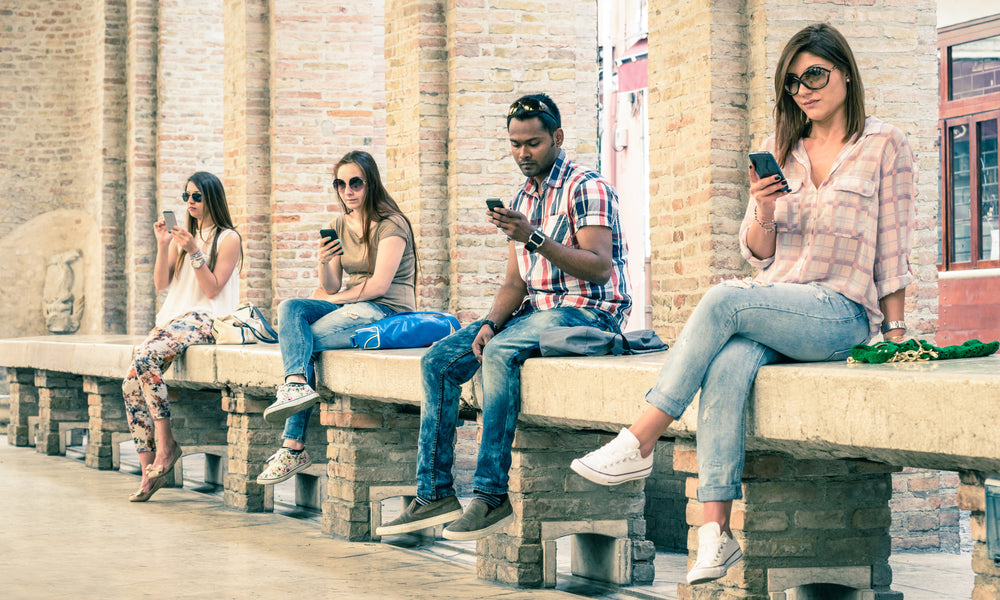
I had a very surreal experience last year while travelling in the USA. From the moment a taxi driver dropped me off at an airport terminal to the moment I landed at my next destination, I did not speak to another human. In that time I checked in my luggage, proceeded through security, ordered and ate my lunch, purchased a takeaway cup of tea, shopped for a new paperback, and boarded my flight.
I didn’t have a conversation with another human for the five hours that I was in transit because there was no need to have one. Terminal C at the Newark International Airport is the subject of a $120 million dollar makeover in which everything has been automated via iPads. You don’t need to ask someone if your flight is on time, an iPad tells you. You don’t need the hassle of a waiter to order your food, an iPad orders it for you. You don’t even need to hand your ticket to a flight attendant because an iPad checks you in.
The experience was nothing short of bizarre. Far from being instruments of efficiency, the iPads were more like glaring slot machines, preventing me from making eye contact with another person and encouraging me to buy more, more, MORE. I felt as though I had glimpsed a very real, very dismal, not-too distant future. It was a lonely and miserable insight.

To be clear, I am no luddite. I have a laptop, smart phone, iPad, bluetooth headphones, fitness tracker (two actually) and I’ve had a smart TV in my lounge room since before they were even invented (it’s called a computer). Although I’ve recently done a digital detox on my life, I know all about social media and why it’s so great. But my problem with my visit to Newark was that the so called “airport of tomorrow” robbed me of experiencing the very best part of travel; soaking in a new culture by connecting with people.
I’ve written extensively on this blog and in my book about how loneliness was one of the contributing factors leading to my autoimmune disease 13 years ago and how there is now comprehensive data demonstrating that feeling isolated is on par with other major risk factors that routinely make the list of public health concerns such as lack of exercise, obesity, addiction and mental illness. I’ve also written about how over the last two decades, in which we’ve become increasingly more connected via the readily available, vast and expansive inter-web of everything, loneliness is reaching epidemic proportions. In the US, loneliness affects one-fifth of the population. In the UK, it is experienced by more than a third of those over the age of 50. This worries the UK government so much that it has recently appointed its first minister of loneliness.
How can this paradox be?
It turns out that while it seems technology allows us to be connected to our loved ones 24/7, research actually shows that it may be making many of us feel lonelier. For example, one study of over 13,000 people found that people who spent more time browsing the web also tended to report being lonelier and less satisfied with life. Another found that if people spent more than two hours a day on social networks, their chances of feeling socially isolated are twice as high. While online communities can be great, it’s clear there is a big difference between an online social network and a real one.
It also seems that the very devices designed to connect us may actually prevent us from doing so in a meaningful way. One report found that 89 percent of phone owners said they’d used them during their last social gathering, and that 82 percent felt that when they did so, it damaged the interaction. Another study, poignantly titled, “My life has become a major distraction from my cell phone” concluded that when a spouse checks out of the real world and into the virtual one, conflict arises and it negatively impacts their relationship. The authors concluded, “It is ironic that cell phones, originally designed as a communication tool, may actually hinder rather than foster satisfying relationships among romantic partners.”
Although it may seem like we’re living in a technologically advanced age, compared to the thousands of years that nature has had to develop the optimum method for human connection, tech is in its infancy. Tablets, phones, apps, and social media networks have a long way to go before they will ever be able to deliver the nuanced conditions that form the bedrock of meaningful human interactions. In an age where ATMs have replaced bank tellers, when supermarkets have self-checkouts, and when even your university degree can be obtained without ever interacting with a real-live academic expert, it is now entirely possible to move through your life without connecting to anyone at all.
I acknowledge that technology allows us to stay connected through our day, to reach out in times of stress, and to easily stay in touch with long-distance friends and relatives. But having dived into the emerging literature on technology use, I’m all too aware that when I’m buried in my phone, I can’t read my kid's face expressions. When I receive a text message, I can’t hear the tone of my husband’s voice. And when I order my meal at the Newark International Airport from a faceless, accent-less, monocultural iPad, I feel more connected and more lonely than ever before.





 My Year of Living Mindfully (DVD)
My Year of Living Mindfully (DVD) The Connection (DOWNLOAD-TO-OWN)
The Connection (DOWNLOAD-TO-OWN) My Year Of Living Mindfully - Book
My Year Of Living Mindfully - Book




